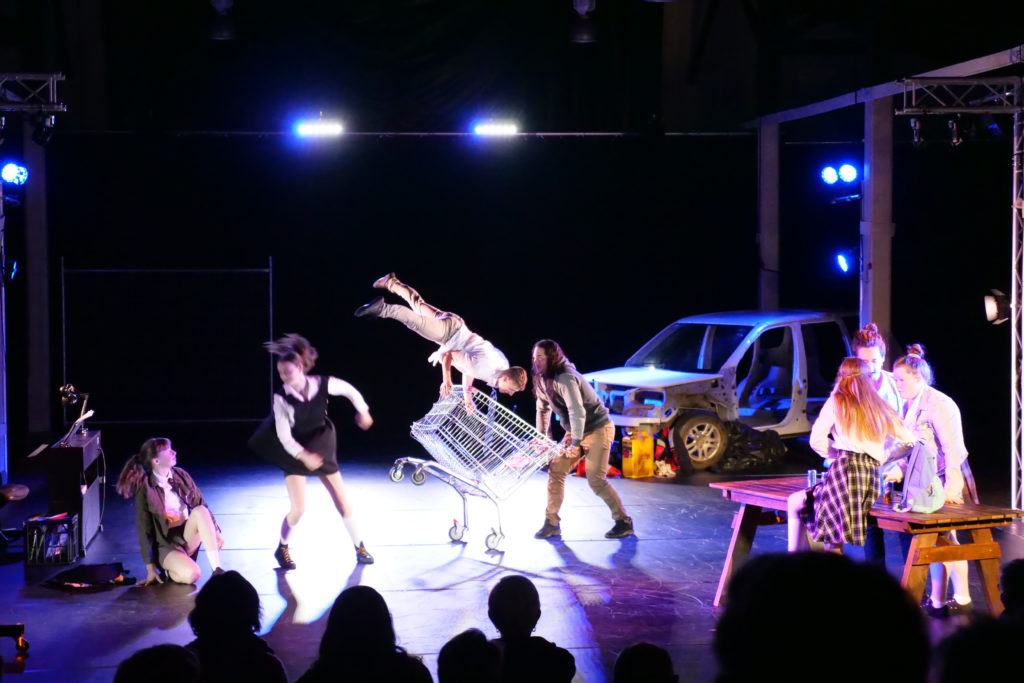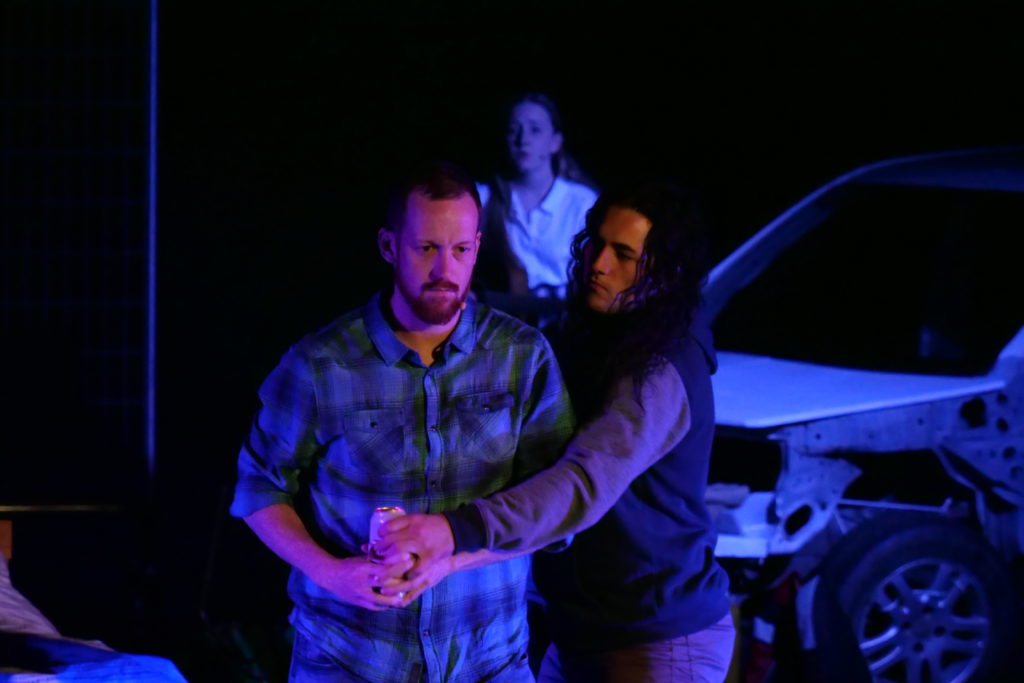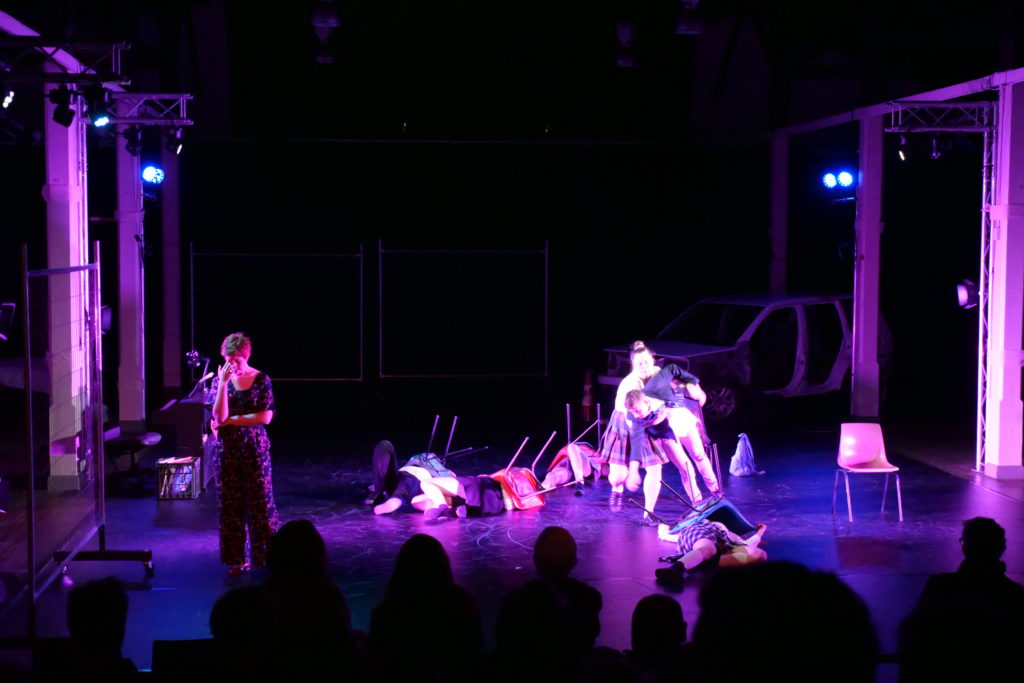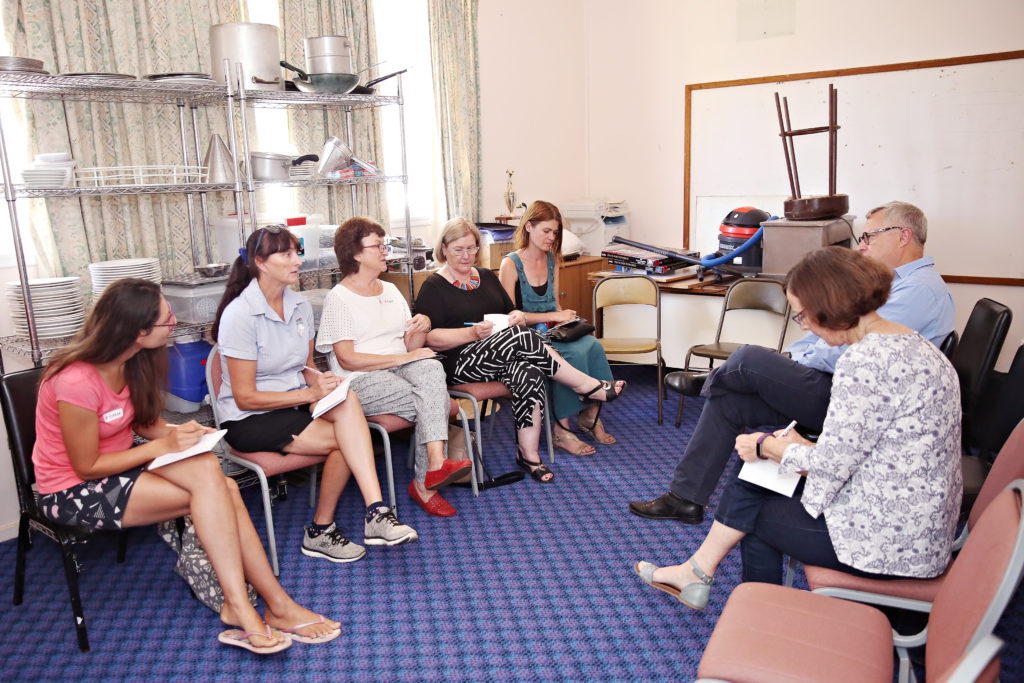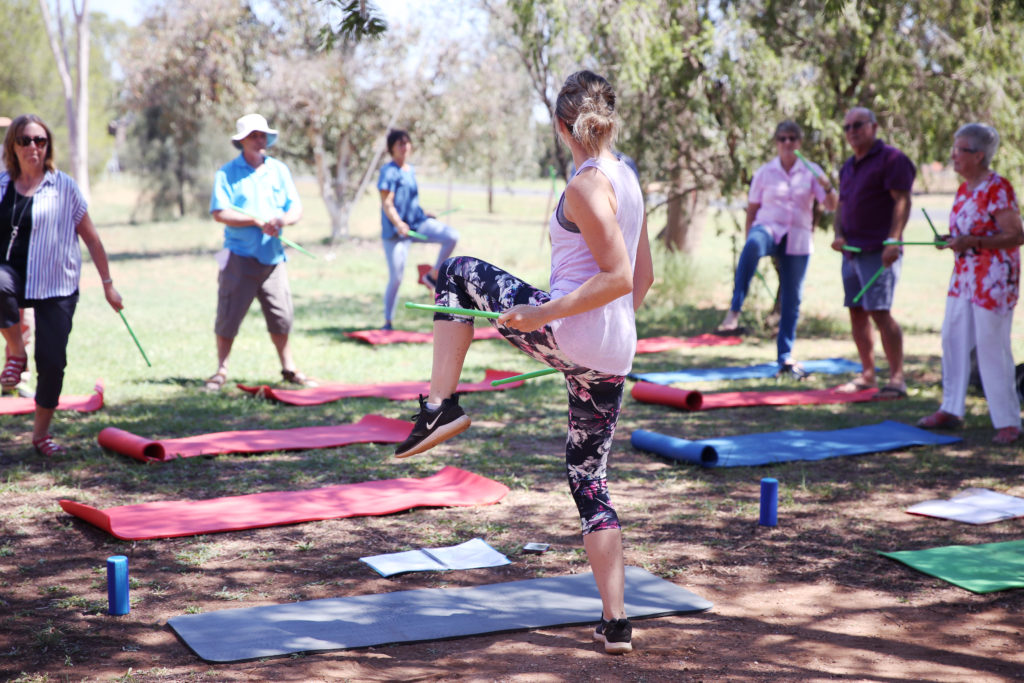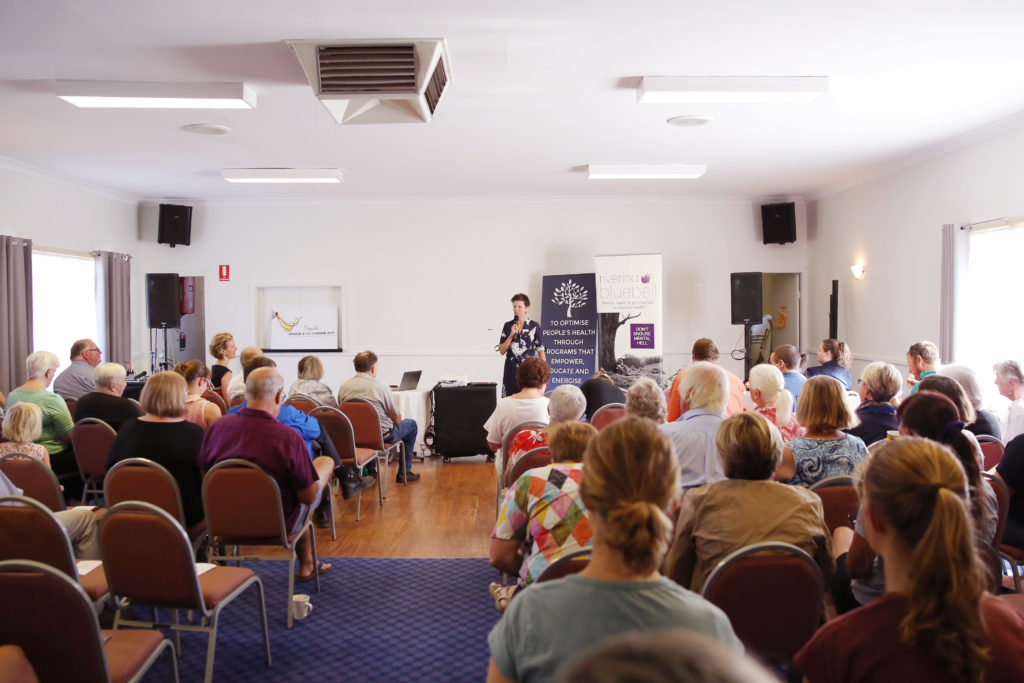Foundation for Rural & Regional Renewal (FRRR)
FRRR has awarded $200,000 to 11 locally-led community initiatives that will provide mental health and wellbeing support for remote, rural and regional communities.
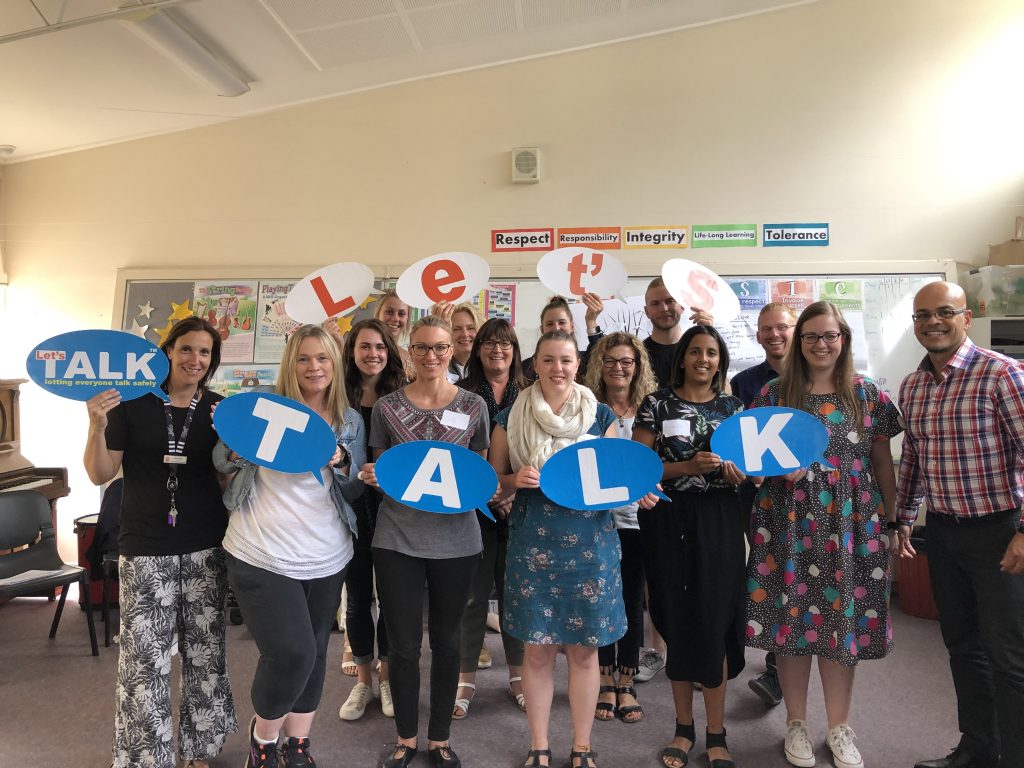
Funded through the In a Good Place (IAGP) program, these grants provide support for community-driven initiatives that reduce social isolation, increase social participation and encourage people in remote, rural and regional communities who are at risk of, or are experiencing, mental health issues to seek help. The national grant program, now in its fifth year, is funded by CCI Giving, the charitable foundation of Catholic Church Insurance (CCI).
This year, the IAGP grants awarded range from $12,000 to help local businesses and their employees in Kingaroy, QLD to support and improve mental health and wellbeing through a series of workshops, through to $20,000 to provide immediate, person-centred, and compassionate care for community members experiencing mental distress by establishing a peer-staffed, community drop-in centre in Castlemaine, VIC.
Natalie Egleton, CEO of FRRR, said it’s critical to offer this program, as many rural communities across Australia don’t have access to the level of resources that they need when it comes to mental health and wellbeing support.
“Many rural people rely on a sense of strong community to get through the difficult times. But, after a year and half of COVID-19 restrictions, the events and activities that would usually be a way for people to connect and heal, haven’t been able to go ahead. So, many people are feeling increasingly disconnected and socially isolated,” Ms Egleton explained.
“On top of the cumulative impact of natural disasters like drought, fires, flood and cyclones, this has meant that many rural Australians now have an even greater need for both preventative mental health measures, as well as non-clinical support for mental health and wellbeing issues. It also means that communities have had to think outside of the box and find new ways of helping people to connect and care for their mental health.
“That’s why it’s really encouraging to see so many innovative, community-led initiatives that are geared towards helping people in remote, rural and regional communities gain better access to the mental health support that they need.
“We’re grateful to be able to partner with CCI Giving to support these local projects, which we know will really make a difference,” said Ms Egleton.
Jeremy Yipp, CCI General Manager, General Insurance Claims and Chair of CCI Giving, said that improving rural Australia’s access to mental health resources is crucial.
“The In a Good Place program provides important support that is now, more than ever, vital for the mental wellbeing of rural Australia. We are pleased that through our partnership with FRRR we are able to provide funding for these community-led initiatives designed to support and connect the community to the tools they need to care for their mental health and wellbeing,” Mr Yipp said.
Some of the 11 mental health initiatives funded include:
- Wesley Mission Queensland – Murgon and Cherbourg, QLD – Marcus Mission – Building Suicide Prevention Community Capacity in South Burnett – $18,619 – Boost the community’s ability to support vulnerable males by training and supporting local men to deliver the Marcus Mission suicide prevention initiative.
- Pro Patria Centre Ltd Ashmont, NSW – Kitchen Garden to Plate: Nutrition for the Mind, Body, and Soul – $17,160 – Support the mental health and social connection of veterans, first responders and their families by developing a kitchen garden to support future therapeutic gardening and nutrition programs.
- Quorn Community Sporting Assoc Inc – Quorn, SA – Don’t Wait til You’re Stuffed! – $13,900 – Encourage people to come together and boost community resilience by bringing in a guest speaker to share vital tips and advice.
- Dignity Supported Community Garden – Nubeena and Dodges Ferry, TAS – DIGnity Supported Gardening Sessions – $19,440 – Improve social participation and support mental wellbeing of vulnerable community members by providing expert mental health counselling and Occupational Therapist support to participate in therapeutic horticulture sessions.
- Healesville Primary School Healesville, VIC – Let’sTALK Program at Healesville Primary School – $20,000 – Empower staff, students and families to feel safe to talk openly about their mental wellbeing and provide skills to encourage and support help seeking behaviours through a shared program of learning.
To support grants like this through FRRR, make a tax-deductible donation at https://frrr.org.au/giving/.
The full list of grant recipients and their projects are below:
| Organisation | Project | Location | Grant |
|---|---|---|---|
| Castlemaine Community House Inc | Castlemaine Safe Space Support community members experiencing mental distress by establishing a peer-staffed, community drop-in centre by providing immediate, person-centred, and compassionate care in a non-clinical setting. | Castlemaine, VIC | $20,000 |
| Central West Family Support Group Inc | In a Good Place Build mental health awareness in the community to reduce stigma and improve mental health and wellbeing | Condobolin / Lake Cargelligo / Murrin Bridge, NSW | $20,000 |
| Circular Head RSL Sub Branch Inc | Canines Fostering Community Connections - Improving Veteran Well-being in Rural Tasmanian Communities Improve the social participation and mental health of veterans by supporting their pairing with and training of Assistance Dogs. | Smithton, TAS | $19,613 |
| Dignity Supported Community Garden | DIGnity Supported Gardening Sessions Improve social participation and support mental wellbeing of vulnerable community members by proving expert mental health counselling and Occupational Therapist support to participate in therapeutic horticulture sessions. | Nubeena / Dodges Ferry, TAS | $19,440 |
| Healesville Primary School | Let'sTALK Program at Healesville Primary School Empower staff, students and families to feel safe to talk openly about their mental wellbeing and provide skills to encourage and support help seeking behaviours through a shared program of learning . | Healesville, VIC | $20,000 |
| Kingaroy Chamber of Commerce & Industry Inc | SHINE - Supporting Mental Wellbeing through Information, Leadership and Education - Stage 2 Boost and strengthen community resilience by running workshops to help local businesses and their employees support and improve mental health and wellbeing. | Kingaroy, QLD | $12,000 |
| Pro Patria Centre Ltd | Kitchen Garden to Plate: Nutrition for the Mind, Body, and Soul Support the mental health and social connection of veterans, first responders and their families by developing a kitchen garden to support future therapeutic gardening and nutrition programs. | Ashmont (Wagga Wagga), NSW | $17,160 |
| Quorn Community Sporting Assoc Inc | Don't Wait til You're Stuffed! Encourage people to come together and boost community resilience by bringing in a guest speaker to share vital tips and advice. | Quorn, SA | $13,900 |
| Southern Yorke Peninsula Community | Youth on Yorkes Help local youth-focussed organisations to understand and support young people to develop mental fitness and resilience through the employment of a dedicated youth worker. | Yorketown, SA | $20,000 |
| The Southern Highlands Foundation | Grand Friends Foster friendships and increase social connection by bringing together residents from the local aged care facility with primary school children for shared activities. | Bowral / Moss Vale, NSW | $19,268 |
| Wesley Mission Queensland | Marcus Mission - Building Suicide Prevention Community Capacity in South Burnett Boost the community’s ability to support vulnerable males by training and supporting local men to deliver the Marcus Mission suicide prevention initiative. | Murgon / Cherbourg, QLD | $18,619 |
In Coorow, WA, a rural town 270km north of Perth, the Coorow Community Resource Centre (CCRC) provides professional and friendly services to the community, from access to information through to community development, arts and culture, training and more.
The township has a population of 200 and is the business and social hub for many small surrounding localities in an area dominated by farming. The industry in WA’s mid-west is changing, with businesses amalgamating, so the family farm is now often part of a larger enterprise. Businesses rely more on casual workers, reducing the local population and having a flow on effect with isolation, as a result of there being greater distances between farming families.
The community had been shaken by a number of tragic mental health incidents, after which the CCRC saw the opportunity for more informal, activity-based gatherings to support the local community.
Coming together to support one another
Our In a Good Place program was the perfect fit to support this group in their aims. They successfully applied for a grant of $10,350, funded by CCI giving, and got to work planning a series of motivational community dinners to encourage the Coorow community to come together for shared learning and social interaction.
The FRRR grant enabled the group to engage guest speakers for the ‘On Speaking Terms’ event, helping cover the high cost of travel that often precludes bring well-known talent to the community. Guest speakers Peter Rowsthorn, Ernie Dingo and Karl O’Callaghan were a special drawcard to get the community together. Events were held at the Coorow District Hall in March, July and October 2019, on dates that worked within the local farming calendar for the people of the Shire of Coorow and surrounding shires of Perenjori, Carnamah and Moora.
Each event also included presentations from mental health services in the region such as Wheatbelt Mens’ Health, Midwest Health service and the Desert Blue organisation. Dinners were catered by the CCRC and four school students from the area volunteered as wait staff. A ‘goodie bag’ was given to attended to take away, including a Health Services in the area booklet compiled by the CCRC. The evenings were advertised and reported on by local newsletter, the Coorow Magpie Squawk.

An engaged community
In acquitting the grant, Deborah Maley, Coordinater at CCRC wrote, “The Coorow CRC achieved everything we set out to with this program. We delivered three evenings with high profile speakers and had an amazing attendance at each and every one.
“Each speaker had a different way of putting forward their message and this meant that everyone could relate in different ways. All speakers created conversations within the attendees and also with the community as a whole.”
The group estimated they might get 100 attendees to the event, but their smart planning and promotion enticed 224 people in total to attend the series, a remarkable outcome for a town of just 200 people. They have since reported that health agencies represented at the dinners have been contacted by community members following the information sessions, so they are hopeful that the message is reaching some of those local people that will benefit from mental health support.
$200,000 available to fund community-led mental health initiatives
FRRR, in partnership with CCI Giving, is once again offering grants to support grassroots initiatives that improve and strengthen the mental health of communities in remote, rural and regional Australia, through the In a Good Place (IAGP) program.
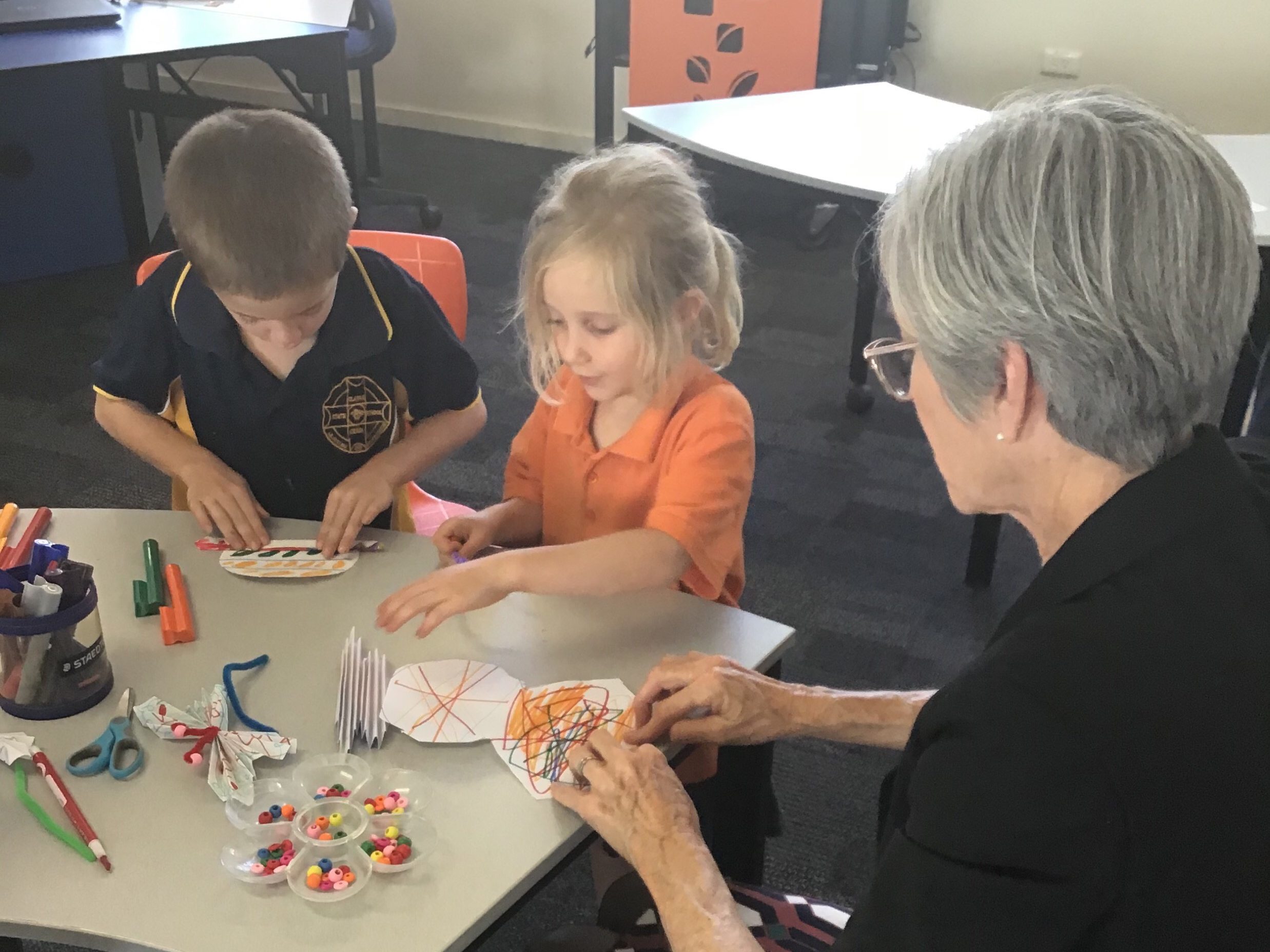
The IAGP program, now in its fourth year, is the centrepiece of a five-year partnership between FRRR and CCI Giving. To date, IAGP has awarded $600,000 in grants to 42 community-led projects that foster good mental health and wellbeing in remote, rural and regional communities.
This year, $200,000 is available, with grants up to $20,000, for projects to ensure that communities have access to mental health services and support; to build and nurture social connections and community participation; and provide access to mental health training and education.
Jeremy Yipp, General Manager, General Insurance Claims at CCI and Chair of CCI Giving, said social connectedness is so important for the mental wellbeing of those living in rural communities, particularly during times of crisis.
“In the last three years, the In a Good Place program has funded a range of community-led projects that have encouraged people to stay connected, seek help and feel supported, especially in rural areas recovering from events such as drought, flooding and now COVID-19.
“Like CCI Giving, FRRR shares our belief in the value and importance of remote, rural and regional communities and recognises that maintaining good mental health is a multi-faceted and lifelong process, requiring a range of approaches to accommodate for different needs and priorities – like responding to an unprecedented event,” said Mr Yipp.
Natalie Egleton, FRRR’s CEO, said that COVID-19 has amplified the need for equitable access to services and trained support in rural Australia.
“As the impact of the pandemic on people’s mental health and wellbeing continues to evolve, it’s more important than ever that those living in remote, rural and regional Australia have access to mental health services, tools and support,” Ms Egleton said.
These tools include mental health training and education, which can then go on to ensure greater access to critical services and professional support.
“One of the very first grants funded through this program was led by Lifeline Tasmania’s Suicide Bereavement Support Group. Their project expanded its program outside of Hobart and into four rural Tasmanian communities that had been identified as having heightened risk of impacts from suicide deaths in the community,” Ms Egleton explained.
“Through the project, locals were empowered to provide access to mental health support in their own community and were given training and resources to increase community understanding and knowledge of suicide postvention.
“Our partnership with CCI Giving means that we can support these kinds of community-based, non-clinical mental health approaches, which we know are more approachable for people in rural areas who may be unwilling to seek help due to a culture of self-reliance, and fear of the stigma associated with asking for help,” Ms Egleton said.
FRRR expects this will be a highly competitive program and so there is a two-stage application process. A brief Expression of Interest must be submitted no later than 8 June 2021. The Expression of Interest form and more information is available here. Applicants can also call 1800 170 020.
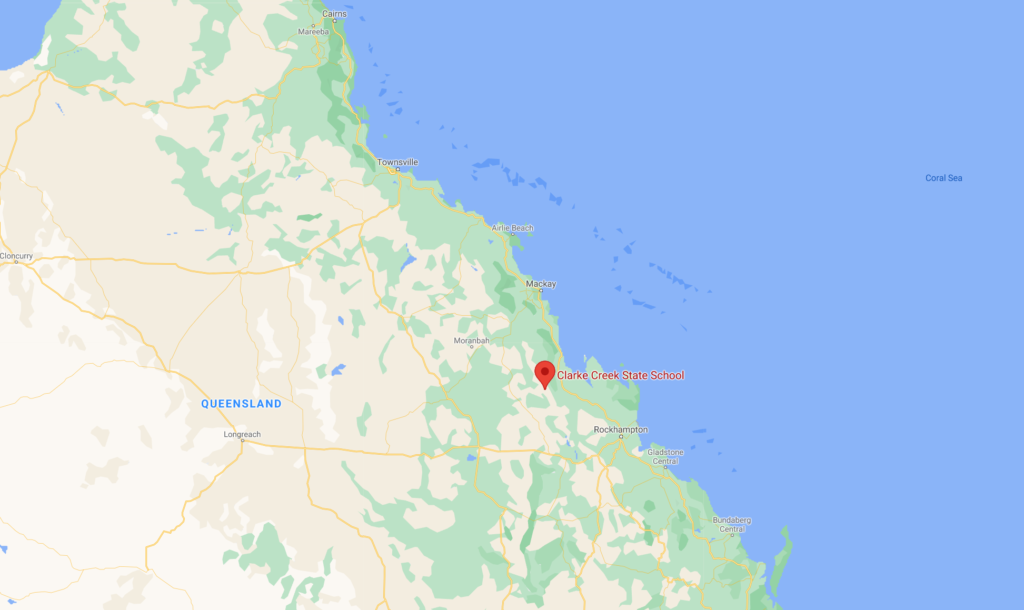
In the remote locality of Clarke Creek in Queensland’s Isaac Region, a community of 320 people have been doing it tough in recent years. In March 2017 Tropical Cyclone Debbie and flash flooding devastated the area, and then came the drought.
People from Clarke Creek mostly own or work on cattle stations, many run by extended and intergenerational family groups. School-aged children in the area were exposed to many impacts of Cyclone Debbie – from damage to community and family infrastructure, livestock and pet animal losses, to financial strain putting pressure on their families.
A problem-solving school
The saving grace of this community is the Clarke Creek State School (CCSS), which, in the absence of a township, serves as the community hub. It caters to the needs of 17 students from Kinder to Year 6, extends support to siblings, parents and extended families of those students, and provides a meeting place for all groups in the area, including the P&C Association.
The Clarke Creek P&C Association knew it was critical to support children through all this, and that school can help facilitate healing by providing the sense of normality that’s needed after a disaster. Since residents of Clarke Creek had to travel up to 230kms to access health and professional services, the P&C Association knew that, for help to be constructive, it would need to be brought into Clarke Creek.
The school had previously gained the services of a chaplain directly though the National Schools Chaplaincy Program, however the school could only afford one visit per fortnight without outside funding. By late 2018, it was clear that there was a need for ongoing disaster support for families. With so many pressures affecting the ability to fundraise locally in the tiny community, the P&C Association applied to FRRR’s In a Good Place program. A grant of $10,000 funded by CCI Giving essentially doubled the chaplain’s visits to weekly from July 2019 until March 2020, when the Department of Education funding applications opened.
Chaplaincy support proves vital
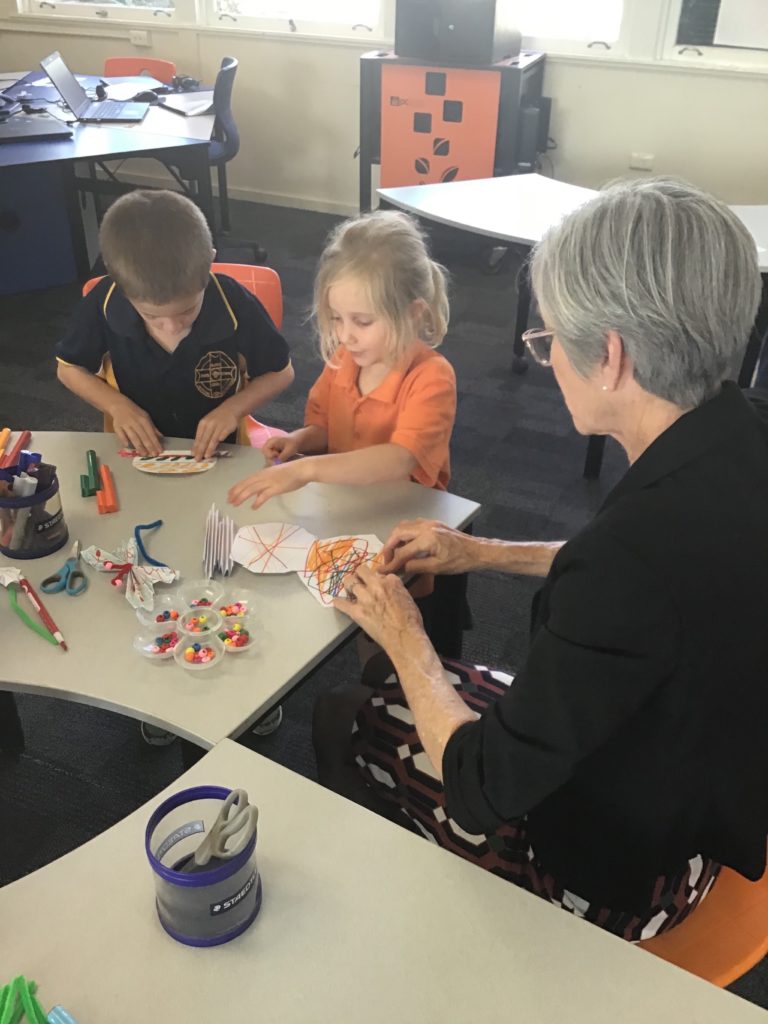
In small schools, the school chaplain is often the welfare provider, and plays a key part of the school support team.
The chaplaincy support at CCSS started shortly after the school and community were devastated by cyclone Debbie, and proved to be highly valuable to students, staff and the broader community, in their ongoing recovery and general mental health and wellbeing. The chaplain attends the school one day each week, working with the children in groups and one on one sessions. She provides emotional support and fosters leadership and kindness in the classroom, playground, and at school events.
“Chappy’, as she is fondly nicknamed, has been imparting those crucial life skills to the children and helping them to deal with the many challenges unique to living in a remote community in an isolated context.
It was a crucial time to bring in extra support, and the P&C Association don’t make light of the importance of Chappy’s role. Throughout COVID-19, the chaplain helped children deal with changes to their learning and became a central figure of stability for parents and the wider community.
The CCSS Principal notes how important the chaplain is in helping students transition through their education.
“I think the older students love the way she makes sure they all know that they have a voice and that someone cares enough to make the time to listen. She helped prepare older students for boarding school, and taught younger ones to be engaged in learning and practising kindness.”
The chaplain attends school and community events, and works with other schools in the cluster, thus creating support networks in the broader communities and creating an inclusive atmosphere and strengthened sense of community. But it’s the flow-on effects from the children’s gains that have the greatest power, as described in the final report:
“Our greatest achievement has been just stabilising our community. Oddly, this was really achieved through the children coming home from school with this positive energy and outlook from their time with Chappy, rather than working direct with parents and community. When the parents knew the kids would be ok and had someone strong to lean on, it was like a weight lifted and the school became the place of ‘normalcy and support’. Things picked up from there.
“In a small school and community, we have to stick together. Chappy has fostered this sense of belonging and caring in our children and it emanates from there.”
Tackling stigma around youth mental health
Mental health difficulties are the most common health challenges for young people, with between 20-25% of Australian adolescents experiencing a mental health or substance abuse issue in any given year. In the Bega Valley, youth mental health has been identified as a major issue facing the region. With a lack of public transport, limited education opportunities and few social spaces for young people – outside of playing a sport – a youth dance organisation has become an important alternative and a vital hub for self-expression and creativity.
Bega-based fLiNG Physical Theatre provides opportunities for young people to work with local and visiting professional artists to create original contemporary performance projects. They aim to give voice to regional perspectives, and designed a powerful youth-centric research and performance project called ‘My Black Dog”, which set out to learn about and support the mental health of young people living in the Bega Valley.
The project had two components; the creation of a moving, original performance exploring youth mental health, and the design and delivery of wellbeing workshops for high school students exploring how they can creatively and practically support their wellbeing. But to deliver it, they needed increased resourcing and capacity.
A grant of $17,700 from FRRR’s In a Good Place program, funded by CCI Giving, was awarded and spread across the project to help realise the final performance outcome. It enabled the employment of two fLiNG Alumni, who returned to the Bega Valley to perform in the work, demonstrating potential future pathways for younger fLiNG Company members, who look to these people as role models. Funds also supported a local year 12 fLiNG Alumni to be employed to co-deliver the Art & Wellbeing workshops in schools around the region, ensuring the program is relevant and speaks on the level of those it’s being delivered to.
The live performance, entitled ‘My Black Dog’, was co-created with fLiNG Company members (14-18yrs) across all aspects of activity. The work’s themes – isolation, disconnection, grief and bullying – were set in a school context, and recognisable for many in the young audience. The uncomfortable territory also revealed the characters’ resilience and capacity for them to reach out and support one another.
It ran for a season of eight performances. This project reached more than 750 individuals, and the Art & Wellbeing workshops were delivered to 152 students in local schools. It all helped to break down stigma, learn about what is occurring in the community, and help generate conversation on an issue that is often difficult to talk about. Each performance was supported by local mental health professionals.
The community response to the show was exceptional, and many were inspired to share their own stories. Exploring and talking about the difficulties that young people come up against is the best way to begin to solve and heal them, and fLiNG Physical Theatre is contributing to the conversation in a highly creative and collaborative way. It was the recipient of the 2019 WayAhead Mental Health Matters Award for Youth, and shortlisted for an Australian Dance Award.
Gabriella Rose, fLiNG’s Co-Artistic Director, explained that the project has enabled a deeper understanding of how mental health issues may present in a young person, and what things can be done to support them.
“It has also revealed the enormity of the problem in regional areas, the lack of infrastructure and support available to isolated people. Through round table discussions with school welfare officers, mental health workers, parents and teens, it revealed how overwhelming the situation can be, but also how hard people are working to build better support structures around vulnerable young people in our community.”
The project’s final report also notes:
“Ultimately the My Black Dog project reiterated that within our community, mental health issues are common, and they can impact everyone. fLiNG’s Artistic Directors saw the Bega Valley community take up the offer to connect with this work and to start a conversation. The more we talk about mental health, the better we will become at looking after ourselves, recognising when we need support, and helping each other get through it.”
Freestone is a small, farming community located west of Brisbane, in Queensland. The town has been hard hit by ongoing drought, job losses and declining mental health and wellbeing among community members.
In 2015, the Freestone Memorial Hall began holding ‘Friday friendlies’ to bring community members together for social catch-ups. These events were particularly important as the drought worsened in 2018, with the economy slowing down due to layoffs. As times got tougher, the attendance at the Friday Friendlies increased.
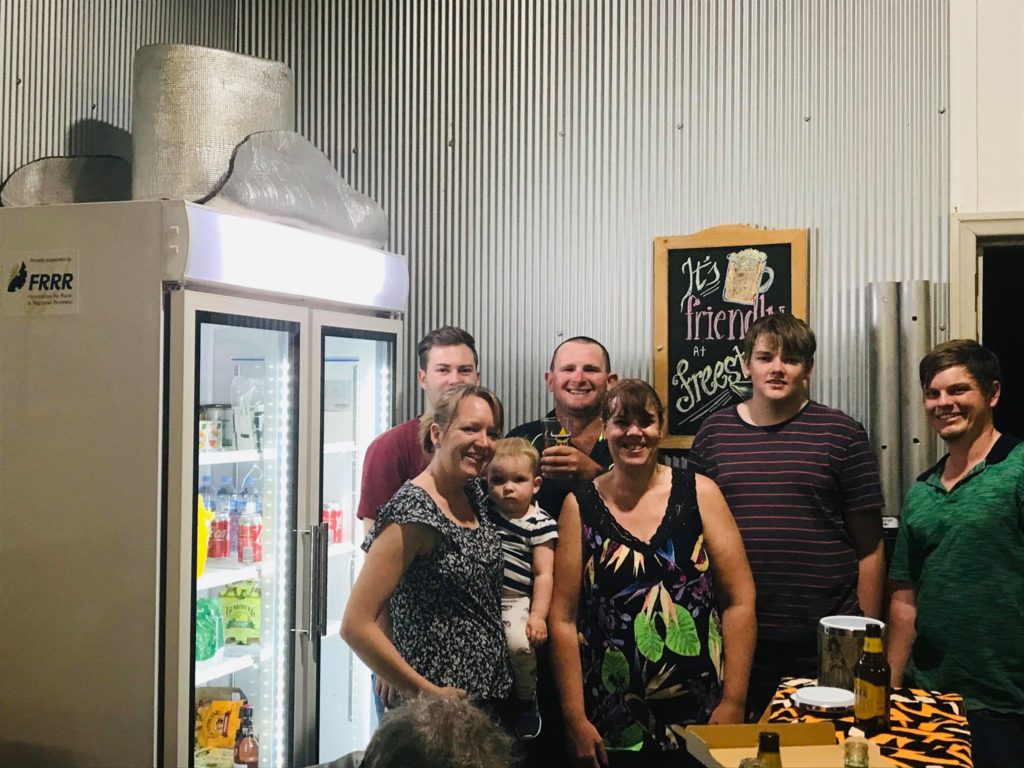
Because of the importance of this social event, the Freestone Memorial Hall wanted to ensure the space was safe, could host the growing number of visitors, and had the updated facilities needed to ensure everyone could come together for a good time.
Freestone Memorial Hall was awarded a $10,000 grant, funded by the Australian Government, and administered by FRRR as part of the Tackling Tough Times Together Grant Program, to upgrade their facilities, install a data projector and integrated PA system and undergo renovations to fix an unsafe floor.
“Since installations and repairs have been completed, we have run five Friday Friendlies with increasing numbers at each Friendly. We are now averaging 50 people per night with a broad cross section of the community coming together to share their experiences of the month. This has proved particularly important as the drought continues,” Simon Goddard, a volunteer committee member for the Hall, told FRRR.
“We are even getting people back to the Friday Friendlies as they hear of improved facilities and increasing numbers. It is becoming self-perpetuating and has a very promising future.”
The new projector has been a popular addition for many locals, who enjoy getting together to watch live sports and tournaments.
The grant also allowed the community group to purchase a fridge, which not only keeps their drinks cold for events, but generates some income for the Hall. This modest but sustainable income makes it possible for the community to host bigger and better events together. So far, the Friday Friendlies continues to be a success for the Freestone community, with many looking forward to attending the gathering every week.
$200,000 in grants awarded across remote, rural and regional Australia
24 November 2020: Thirteen locally-run organisations in rural Australia are sharing in $200,000 in grants to support mental health initiatives from the Foundation for Rural & Regional Renewal (FRRR).
Funded through FRRR’s In a Good Place program, grants of up to $20,000 have been awarded to support mental health initiatives across five different states in Australia, thanks to support from CCI Giving, the charitable foundation of Catholic Church Insurance (CCI).
Nearly $1 million in grant funding was requested in this fourth round of the In A Good Place program, emphasising a great need for mental health support and resources across these rural and regional communities.
The impact of COVID-19 restrictions became an additional stressor to communities already trying to cope with the impact of last summer’s bushfires and/or flooding, which has meant many organisations have needed to adapt quickly. Many community groups and not-for-profit organisations in rural Australia have long relied on community events and face-to-face activities to get them through tough times. But with COVID putting a swift halt to many such activities, big meet-ups and concerts have been replaced by online events and small COVID-safe workshops.
Natalie Egleton, CEO of FRRR, said that many rural communities have limited access to the resources and support they need to manage their mental health and wellbeing.
“This year has had tremendous impact on the mental wellbeing of people in remote, rural and regional Australia, which is reflected in the number of applications we received. It is clear that rural communities recognise the need for early intervention and social connection in their communities – and finding new ways to do that despite living with a pandemic.
“It’s very encouraging to see so many community groups bringing forward excellent solutions and projects that will help create new opportunities for personal growth, increase access to care and improve social connectedness in these regions,” said Ms Egleton.
Each organisation awarded a grant has taken their own approach to improving the mental health of people in their community, through tailored projects designed to meet the specific needs in their region.
These projects include:
- Culturally appropriate workshops for Aboriginal women and girls in Western Australia;
- Promoting social inclusion via a youth fish farm and community garden in New South Wales;
- A workshop to help young farmers to develop communication strategies and skills in Victoria;
- Building a Community Network in South Australia; and
- A safe and inclusive community space for locals in Tasmania.
Jeremy Yipp, CCI General Manager, General Insurance Claims and Chair of CCI Giving, said the In A Good Place program provides vital support for communities across rural Australia.
“Managing our mental health is just as important as our physical health – and there is nothing more empowering than accessing the tools you need to take control of your own health. After a tougher-than-usual year, we are very pleased to be able to support some of these locally-run mental health initiatives that work to improve community health and wellbeing.”
The next round of In A Good Place grants will open mid-2021.
The full list of grant recipients and their projects are below.
| Organisation | Project | Location | Grant |
|---|---|---|---|
| NEW SOUTH WALES | |||
| The Buttery Limited | Jubullum Community Fish Farm and Community GardenSupport mental health outcomes for youth at risk through enabling enterprise to develop a sense of achievement and connection with community. | Jubullum | $9,437 |
| SOUTH AUSTRALIA | |||
| Crystal Brook Community Association | Regional Tai Chi Workshop for Crystal BrookImprove community health and wellbeing with access to a quality Tai Chi instruction full day workshop for Tai Chi practitioners to improve knowledge and skills to inspire participants, and introduce other people to Tai Chi. | Crystal Brook | $3,955 |
| District Council of Yankalilla | Fleurieu Coast Community NetworkIncrease help-seeking and community connectedness by developing the Fleurieu Coast Community Network to provide information and co-ordinate events and resources across several townships. | Yankalilla | $9,000 |
| TASMANIA | |||
| Live Well Tasmania | Thriving Waratah-Wynyard: Engagement for Health and WellbeingReduce mental health stigma and improve mental health by providing a safe and inclusive place for people to participate in a diverse range of activities. | Wynyard | $17,412 |
| VICTORIA | |||
| Brophy Family and Youth Servs Inc | D-Force – Defend Your FriendsBuild mental resilience in children and youth in South West Victoria to encourage help seeking behaviours and resist illegal drug use. | Hamilton | $17,371 |
| Entertainment Assist (HPC) Limited | INTERMISSION ONLINE – Remote CommunitiesDeliver ten INTERMISSION online workshops to support the mental health of artists, performers and entertainers living in small rural communities. | Ararat | $20,000 |
| Holy Rosary School Heathcote | Holy Rosary School HeathcoteImprove the educational outcomes and wellbeing of students in Heathcote through specialised, trauma-informed positive education training for teaching staff. | Heathcote | $20,000 |
| Birchip Cropping Group Inc | Tomorrow FarmerSupporting mental health and wellbeing of young farmers through a day workshop that will provide communication strategies and skills to enable a preventative approach to manage and maintain positive mental health. | Birchip | $17,400 |
| Youth Albury Wodonga Inc | Towong Father & Son ProgramReduce social isolation, increase social connectedness and encourage fathers and sons at risk of experiencing mental health issues, to build stronger relationships. | Corryong / Tallangatta | $9,440 |
| WESTERN AUSTRALIA | |||
| Mullewa Community Resource Centre Inc | Melodies, Mates and Mental HealthProvide opportunities to raise awareness of mental health services and how to access them through a series of music events. | Mullewa | $18,897 |
| Shire of Goomalling | Maangart Yorga (Jam Tree Woman)Increase social participation and connection through the provision of culturally appropriate workshops for vulnerable Aboriginal women and girls. | Goomalling | $19,605 |
| South West Counselling Inc | Busselton Dunsborough Alliance Against Depression – Providing Free Mental Health Training to the Local CommunityProviding mental health first aid training and suicide awareness training to local rural communities in Western Australia to improve mental health literacy and reduce stigma surrounding mental health challenges. | Metricup | $17,483 |
| Centacare Family Services | Men Connect Support GroupSupport men in regional WA with a program to provide education and connection to address mental health related issues and access to professional support without stigma. | Geraldton | $20,000 |
The Grease and Oil Change organisation knows how important it is to look after your mental and physical health. It is especially important in rural and remote areas, where resources are scarce and communities may be struggling with unique environmental challenges. Since 2016, they have run workshops aimed at fostering a healthier and more resilient community, and reducing the stigma associated with mental health by facilitating opportunities for individuals to discuss common issues and problems and to seek solutions from others and from health professionals.
The areas of Bedgerabong and Trundle, in Central West NSW, have been tackling drought for many years now. Agriculture is a big industry in the community, and this has been adversely impacted by the ongoing drought conditions, which has led to hard times for everyone.
An $11,200 grant from the FRRR’s Tackling Tough Times Together program, funded by the Australian Government, meant that Grease and Oil Change workshops could be run in both towns. Experts were brought in to talk to locals about their mental and physical health, as well as run practical workshops teaching them a range of skills.
The workshops are now in their fifth year of operations. In each year since its inception, over 60 people have attended the event, with one workshop having over 200 attendees. By providing a casual and relaxed atmosphere, participants feel more at ease in listening and perhaps sharing experiences of poor mental health. Community partnerships with local allied health groups such as Beyond Blue, Rural Adversity Mental Health Program (RAMHP), Active Farmers andSober in The Country mean that community members will be more comfortable with reaching out to a familiar face, rather than a stranger.
Cherie Stitt, who founded the organisation, said, “It was a wonderful community gathering in both Trundle and Corinella. Apart from the wisdom gained from the guest speakers, the audiences were able to socialise and speak more openly about mental health – particularly in light of drought conditions and the failure of crops.
“Take-home and practical measures were some of the most valuable insights from the day – all the way from sleep tips, diet and through to communicating with friends and family.”
Since the workshops began, people in these towns have set about creating their own activities to encourage people to come together. One woman organised a bike riding group with some of the people who attended the workshops. Active Farmers now run a personal training group with locals once a week, encouraging them to try new forms of exercise, like yoga.
COVID-19 has impacted rural communities in countless ways, with increased vulnerability and disadvantage being felt in many communities grappling with successive setbacks, including drought, bushfire and existing disadvantages exacerbated by imposed restrictions.
This means FRRR’s work is more important than ever, as Australia emerges from and transitions into new ways of working, living and delivering services.
While FRRR staff are still working from home, they are connecting daily with communities across the country. Below are some of the insights from the calls, queries and requests they are receiving day to day.
There have been high levels of caller concern around the mental health of their communities, given COVID follows several natural disaster events. NSW/ACT Program Manager Jacki Dimond says that there are also increased personal stress levels around not being able to deliver on approved grant activities and / or timelines. She has been spending much of her time considering more project variations than usual.
“Callers have reflected much relief for the support of our flexibility and desire to support them through the variations process to identify alternative activities or delivery mechanisms, such as the Gunning Arts Festival going online, or extending or deferring acquittal periods where needed, ” Jacki noted.
Vivienne McCrory, Grants Officer for Victoria, SA and Tasmania, echoes Jacki’s comments noting that bushfire affected communities are asking if programs will be assessed the same way due to COVID-19.
“They are still applying, but not sure if the project will still go ahead as planned due to restrictions and whether it would affect their grant chances. They have mentioned exhaustion and frustration over the flow of events since Christmas (on top of the drought).”
Another common theme is while some groups have the option to take activities online, inconsistent telecommunications access and mixed levels of digital literacy means it’s not a realistic option for some groups.
“For example, I received a phone call recently from the Yinnar Memorial Hall over 60’s Exercise group. We have funded the program for two years and up to 40 people were coming each week. They are now delivering the program via zoom and many elderly members are having issues connecting. The internet is also poor in the area!,” explained Hannah Jakab, who works on FRRR’s disaster recovery programs.
VIC/SA/TAS Program Manager Carlene Egan is seeing increased requests to fund local people to take on recovery coordination roles.
“Bushfire affected communities are taking charge of their own recovery with known and trusted people and ensuring funds are directed to where they identify as most needed.”
From a drought support perspective, Deanne Cavalier is seeing reduced volunteer capacity due to COVID-19.
“Conversations with community groups have identified a decrease in volunteering at this time due to the pandemic, as their focus turns towards their families and concerns of job security and general fatigue. Volunteers are often older and health and safety concerns relating to COVID-19 this naturally has had flow-on effects on the capacity of community groups to maintain continuity of services and their ability to maintain momentum on community-focused projects.”
While it’s no longer on the front pages, drought is still a very real issue in large parts of the country as this map of Queensland shows, and this story from WA.
“Despite the wetter start to 2020, the long-term accumulated rainfall deficiencies continue in many parts of Australia and with these continued deficiencies over an extended period, drought continues to be prevalent across much of rural Australia and recovery will be a slow process,” explains Deanne.
Meanwhile, Alli Mudford, Program Manager for the Investing in Rural Community Futures (IRCF) program says that it highlights the importance of building capacity, not just funding ‘things’.
“Building good relationships within each community is a critical foundation for success. The benefits from regular facilitated connections (rather than just providing grants) must not be underestimated and the IRCF evaluation has processes in place to incorporate these learnings.
“We are also seeing that capacity change in the not-for-profit sector crosses generations. Insights show that the younger generation are more than willing to work with and across other not-for-profit groups in the community.”
Rural communities are eternal optimists and innovators and despite the challenges, community groups have been able to adapt their models to keep a source of income, such as offering delivery services, making hand sanitiser or face masks. We are inspired by the growing success of community-led solutions – especially the renewal of local media ownership, which is a reversal of media closure trends.
Grants up to $20,000 available through the In a Good Place program
8 July 2020: Grants of up to $20,000 are now available to not-for-profit organisations (NFPs) throughout rural, regional and remote Australia to support projects that improve and strengthen the mental health of their communities through the In a Good Place (IAGP) program.
The IAGP program, now in its third year, is the centrepiece of a five-year partnership between the Foundation for Rural & Regional Renewal (FRRR) and CCI Giving. It is based on a shared belief in the value and importance of rural, regional and remote communities and a commitment to strengthening mental health and wellbeing within those communities.
A pool of $200,000 is available for community-led projects that reduce social isolation, increase social participation and connectedness, and increase access to help for people within rural, regional and remote communities who are at risk of, or are experiencing, mental health issues.
Jeremy Yipp, Chief Risk Officer of CCI and Chair of CCI Giving, said initiatives that increase the resilience and social connectedness of rural communities not only have direct mental health benefits, but often also lead to improved mental wellbeing by increasing productivity, economic participation, and employment.
“We have seen so many projects funded through the In a Good Place program that have been a beacon of hope for those living in communities doing it tough. They have made a real difference to the resilience, social connectedness and mental wellbeing of rural Australia. Even just sharing experiences and knowing that you’re not alone is, in itself, powerful.
“We encourage community groups to put forward proposals for projects that will help to tackle the mental health challenges their community is facing, especially with the additional pressures encountered due to COVID-19,” said Mr Yipp.
Natalie Egleton, CEO of FRRR, said that COVID-19 has highlighted the impact that isolation can have on mental health and demonstrates why social connectedness, particularly during times of crisis, is so important for the mental wellbeing of those living in rural communities.
“Rural communities have been hit by drought, bushfires, floods and now the impact of COVID-19 restrictions. These events have a huge impact on the mental health of those living in these regions,” Ms Egleton said.
For people living in rural, regional and remote Australia, accessing mental health support is typically more complex than in metropolitan areas. This is due to a myriad of factors including a lack of mental health expertise within the community, the considerable travel time to reach mental health services and specialists and an overarching culture of self-reliance and fear of stigma.[1][2]
“Mental health in rural, regional and remote Australia is a complex issue. Overwhelmingly, there is a consistent need in these communities for better access to mental health services, as well as greater opportunities to strengthen social-connectedness and participation,” Ms Egleton explained.
“It’s not just about those that have a mental health condition having access to clinical services, but also how we can support opportunities to promote mental wellbeing, through the likes of workshops or mental health first-aid training, or simply providing a safe place to chat to someone.”
“Each community is different; with different mental health concerns, needs and priorities. Our partnership with CCI Giving means that we can support community-led initiatives that are meaningful and will have the greatest impact on the mental wellness of those living in these rural communities,” said Ms Egleton.
Applications open on 7 July 2020. FRRR expects this will be a highly competitive program and so there is a two-stage application process. A brief project outline must be submitted no later than 7 August, and full applications for invited projects are due by 11 August 2020.
[1] National Mental Health Commission. Monitoring mental health and suicide prevention reform: National Report 2019. Sydney: NMHC; 2019.
[2] Australian Bureau of Statistics. People living in remote areas are less than half as likely to access a mental health service. Health case study. 2016. Retrieved from https://bit.ly/3e67hIM.

